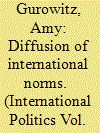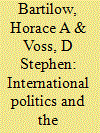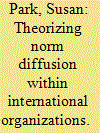| Srl | Item |
| 1 |
ID:
072694


|
|
|
|
|
| Publication |
2006.
|
| Summary/Abstract |
As the literature on international norms grows beyond documenting that norms matter, scholars have increasingly responded to the challenge that they must account for why and when they matter by looking at variation in the impact of those norms across time and place. This article looks at issues surrounding state identity as one understudied factor in determining why norms matter more in some places than others. We know that domestic and international actors often use norms to back-up and make arguments for which they often have few or weak domestic resources. But the context for the use of those norms is important. Mobilization and invocation of international norms domestically occurs within the context of a state's identity and the degree to which those norms are helpful to the actors who use them depends, among other things, on the identity of the target state. This article joins the discussion about norm diffusion by examining two cases involving the incorporation of non-citizens: Germany and Japan. A comparison of these cases suggests that identity and identity crises matter in understanding the differential diffusion of international norms.
|
|
|
|
|
|
|
|
|
|
|
|
|
|
|
|
| 2 |
ID:
072698


|
|
|
|
|
| Publication |
2006.
|
| Summary/Abstract |
Justin Rosenberg gives a very interesting account of the conditions that produce the globalization literature and provides a compelling critique of the theory itself. I want to supplement this with an account of the social conditions that sustain such views. In short, my project is to relate globalization theory to contemporary forms of governmentality and to neo-liberalism in particular. Ultimately this leads me to slightly different conclusions. That is, not the death of globalization theory, but the way it interacts with and is sustained by contemporary practices, techniques and technologies of governmentality.
|
|
|
|
|
|
|
|
|
|
|
|
|
|
|
|
| 3 |
ID:
072696


|
|
|
|
|
| Publication |
2006.
|
| Summary/Abstract |
Previous research indicates that a country's international commerce usually tracks the pattern of its diplomatic entanglements. As the evidence for this observation comes from overall trade statistics, however, analysts have had little ability to probe the sources of the linkage. This study uses major-power trade data from 1962 to 1997, disaggregated by economic sector, within an elaborated 'gravity model' that parses out some of the potential causal paths. Our results indicate that, while (1) commercial exchanges among major powers did 'follow the flag' (2) within all sectors during the period under study, not only those with immediately military value, (3) national traits that are causally prior to foreign relations, but often excluded from studies of international trade, also predicted trade in each sector, and (4) the major-power democracies did not show any particular favoritism to each other after these national differences in trade activity are considered.
|
|
|
|
|
|
|
|
|
|
|
|
|
|
|
|
| 4 |
ID:
072693


|
|
|
|
|
| Publication |
2006.
|
| Summary/Abstract |
How does war affect the structure of domestic interests in democratic capitalist states and how are these interests reflected in the conduct of the war? Developing a second image reversed 'plus' argument (outside-in and then inside-out), I contend that war can alter the domestic balance of political power, and can thereby affect the orientation of a state's security strategy. Wars that induce the extraction of wealth and the mobilization of resources will empower a coalition of domestic actors and interest groups who will lobby the government for an offensive security policy, including greater defense spending, military and industrial conscription, state planning and intervention in the economy, and protectionism. I apply this model to Britain and use a research design based on a longitudinal-controlled comparison over the periods of 1912-1914 and 1914-1916 to examine why Britain escalated its involvement in World War I from Limited Liability prior to the outbreak of the war and during the initial years of the war to a Continental Commitment by April of 1916.
|
|
|
|
|
|
|
|
|
|
|
|
|
|
|
|
| 5 |
ID:
072697


|
|
|
|
|
| Publication |
2006.
|
| Summary/Abstract |
This article argues that Russia's foreign policy towards the West has acquired a relatively high level of continuity over the last few years. When Putin came into power he kept Primakov's foreign policy concept largely intact, but increased its pragmatic character. Under his presidency economic concerns and multilateralism became the leitmotiv. It is argued that this pragmatic character of Russian foreign policy is not pragmatism by default, but a deliberate choice consistent with the country's national interests. Its roots are related to Russia's lack of means to exert pressure and the priority of internal reforms, which make it essential for Russia to avoid international isolation. In the second part, the article evaluates the success of this pragmatic policy by looking at Russia's integration into the world economy and its relations with key players such as the European Union and the United States. This reveals how the nature of Russian foreign policy towards the West has fundamentally changed and shifted away from zero-sum thinking.
|
|
|
|
|
|
|
|
|
|
|
|
|
|
|
|
| 6 |
ID:
072695


|
|
|
|
|
| Publication |
2006.
|
| Summary/Abstract |
International Organizations (IOs) promote and diffuse norms within world politics. This prompts the question: where do these norms come from? This inquiry analyses how IOs have been perceived within the emerging norms literature where IOs are 'norm diffusers' within the international system, and finds that the way in which IOs themselves internalize norms has not been taken into account. This poses a potentially fruitful new avenue of inquiry into why and when IOs behave as norm diffusers. An interpretation of when and why IOs internalize norms is offered by positing that IO identities are not fixed and that they are 'norm consumers' socialized by state and non-state actors.
|
|
|
|
|
|
|
|
|
|
|
|
|
|
|
|